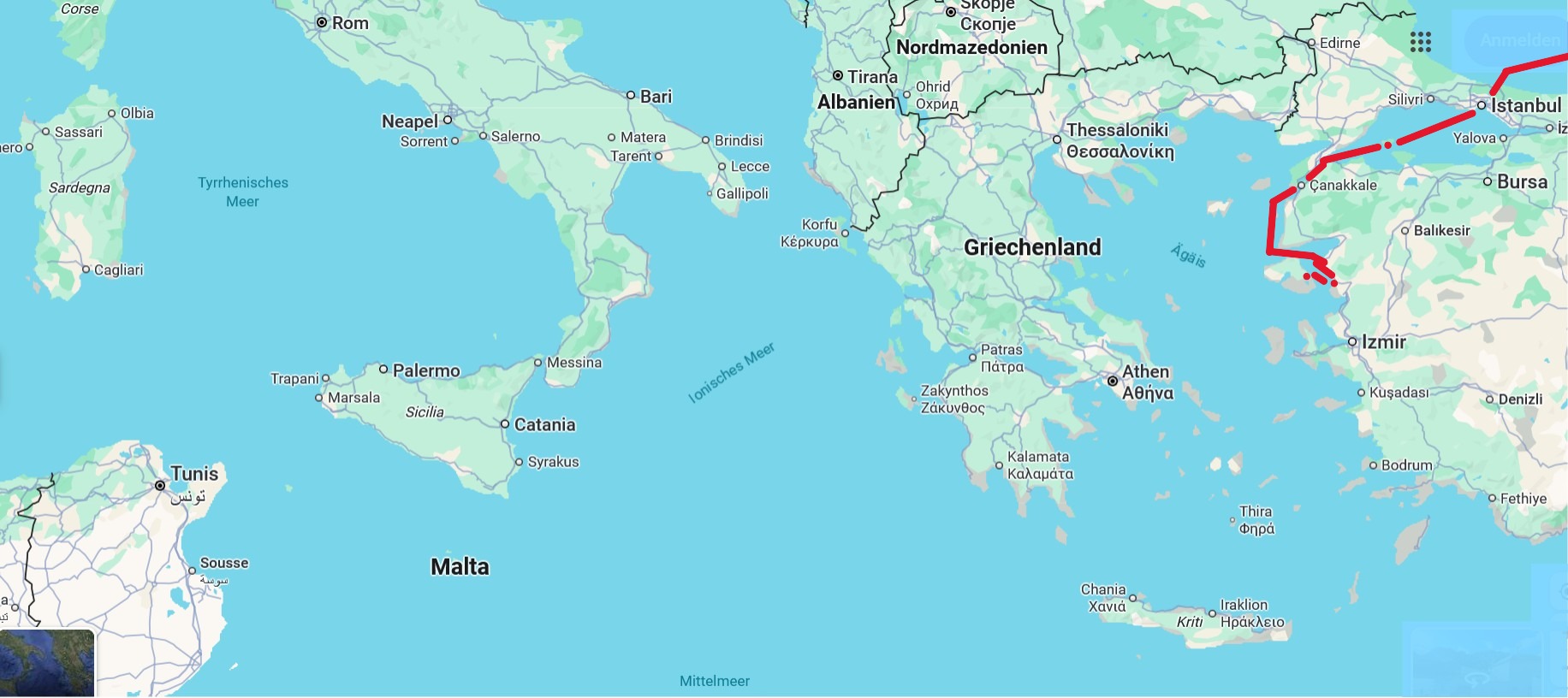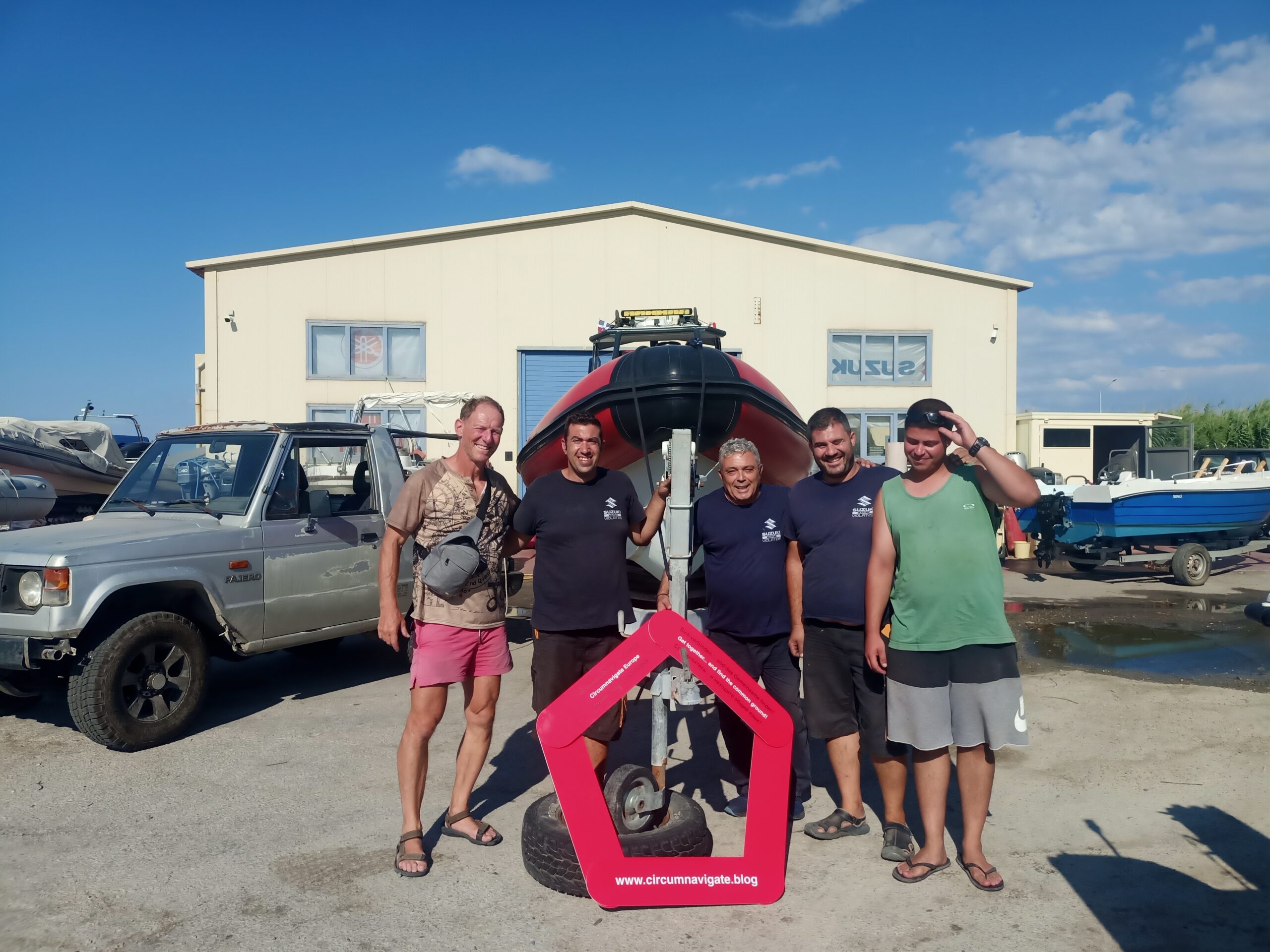The sea may seem so lovely, but one short, violent wave while sailing fast and the whole project is in trouble! – I have thought about what my goal is for this trip.
In addition to getting to know the country and its people on the periphery of Europe, my goal is to arrive safely in Marseille with the ArgoFram, to close the circle, so to speak. Consequence: I have to let go of everything else, all my wishes, whether I should/could still see this or visit that, if they are not beneficial to my goal. And it seems to me that on Lesbos I am getting the help I need to reach my goal.
Goodbye Turkey! I’m chugging over to Lesbos, where I’m intercepted by the Greek navy and escorted to the port of Mytilini. Then follows a procedure lasting several hours to clear customs (into the EU). And somehow, the three different authorities I have to visit seem to be overwhelmed: Is it possible, especially in these times, that a boat captain in faraway Finland clears out of the EU and then wants to “re-enter” a few weeks later here in north-eastern Greece?
Unlike my Finnish colleagues a year ago (after my circumnavigation of north-eastern Europe and passage through Russia), who “merely” sent a few smart officers to kindly interrogate me, pardon me, to talk to me about my adventurous journey, here the bureaucratic machine starts to spin. And sweat.
I am astonished and learning how an administration should not be run. And I think: has Greece really joined the EU? But everything is friendly, without any corruption, just a little complicated (unlike in Turkey, which made clearing customs difficult and expensive for me in the end). After a few hours, I have my papers in my hands – in future, whenever I arrive in a Greek port, I must immediately visit the border authorities and the port police to have my entry and exit certified in a multi-page document with a stamp, date and signature from the official(s). I then have to present the entire document when leaving Greek waters and effectively neutralise it… I also learn that Greece has a separate clearance procedure that runs parallel to the EU one. And it charges a “residence and transit tax” for this …
In any case, my ArgoFram is soon taken out of the water by Dimitris and his men (which is a shame, because the marina in Mytilini is excellent, well run (privately owned), pleasantly inexpensive and equipped with additional services such as washing machines and a superb restaurant). Then it’s about half an hour on a trailer to Dimitris’ workshop, where he analyses the damage and notices that the gearbox has been “shot”. A floating, invisible object must have hit one of the engines in such a way that the gearbox was ruined. So a new gearbox is needed, but there isn’t one to be found in the whole of Greece. Marko finds one through his channels, new and original from Suzuki, and the insurance company covers the damage, so the gearbox is ordered. Express. But it has to go to Greece (Athens) first, then out to this third-largest but remote island. That could take a while…
So I immerse myself in local history – what I “missed” in Turkey (and can make up for later with a separate trip) now turns out to be a stroke of luck: the area around Mytilene has been inhabited for thousands of years. A huge amphitheatre confirms that ancient society must have been prosperous enough to appreciate and promote culture. Sappho is well known for singing about her love for women in her poems and teaching the young women of the island musical skills such as poetry, music, singing and dancing. Mytilini thus became a cultural centre that subsequently attracted philosophers (Aristotle, Theophrastus and Epicurus). With this in mind, and ignoring the many bloody battles for supremacy over this island, I rent a bike and ride around cheerfully – on my way to the workshop, I always pass one of the largest refugee centres in Europe, where up to 20,000 stranded people live. Where they wait to be passed on. Without any idea and obviously without the slightest interest in where they are or how they could prepare themselves for a fruitful life in the EU.
Around this fenced-in but basically open city of barracks – there is a bus station right next to the entrance – it looks really awful … I get in touch with volunteer refugee helpers who are assisting the people here and want to prepare them for “Europe” with courses and educational opportunities, and I experience first-hand how their (idealised) images of these migrants are being shattered by the harsh reality: They have no motivation whatsoever and are all the more preoccupied with the internal power structures (hierarchies, social classes) that are constantly being established in this camp. I hear from these helpers about women who have been raped and children who have been abused in the camp; the almost incomprehensible filth around the entrance to the camp shows that a different world begins here; the surrounding farmers, who are constantly being robbed and even threatened, complain and receive police protection … All this grinds these refugee helpers between a rock and a harsh place.
The fact that I am now stuck here until the new gearbox arrives also has its good side: I am getting some nice company. We rent a car and explore the rest of Lesbos and a special attraction in the north-west of the island: the petrified trees … Until the day, a week later, when the gearbox arrives and I am awakened! Now my attention is back on my goal; the engines have been freshly overhauled by Dimitris and his motivated team, and I’m ready to go. But my sudden enthusiasm for setting off is not well received, and there’s a breakup. Oh dear!

